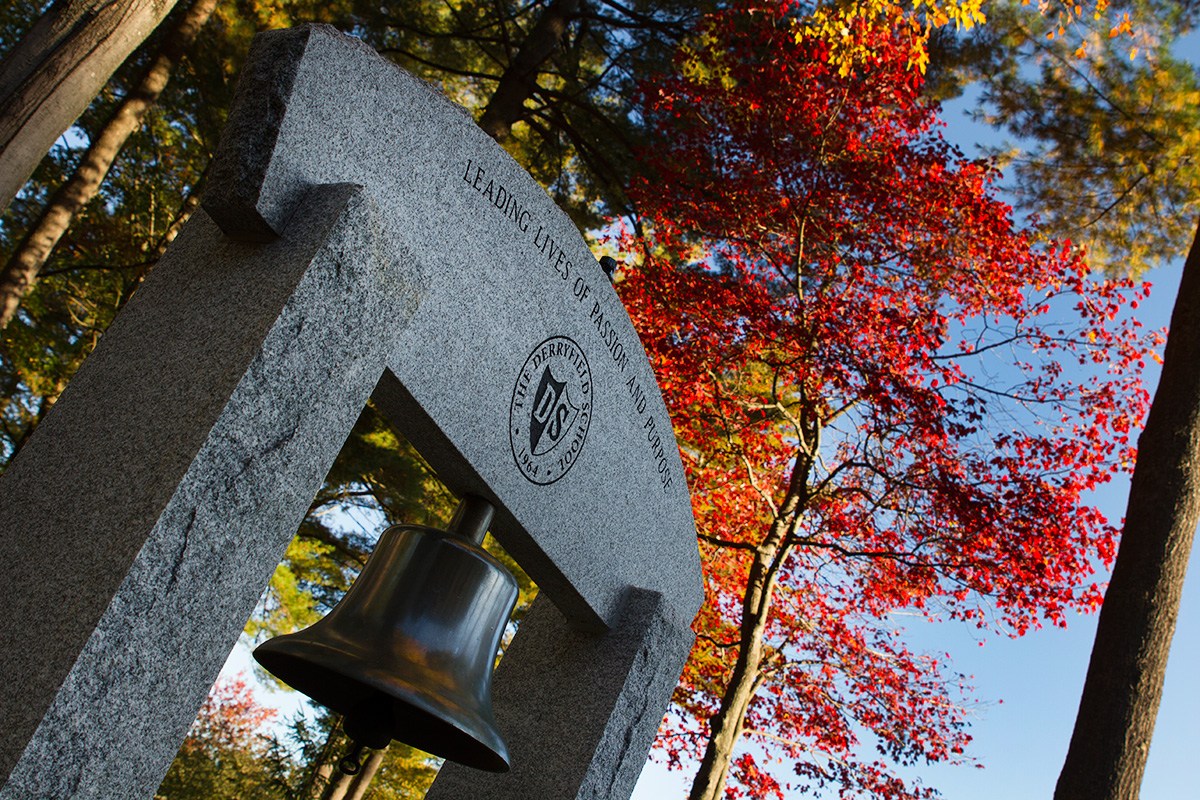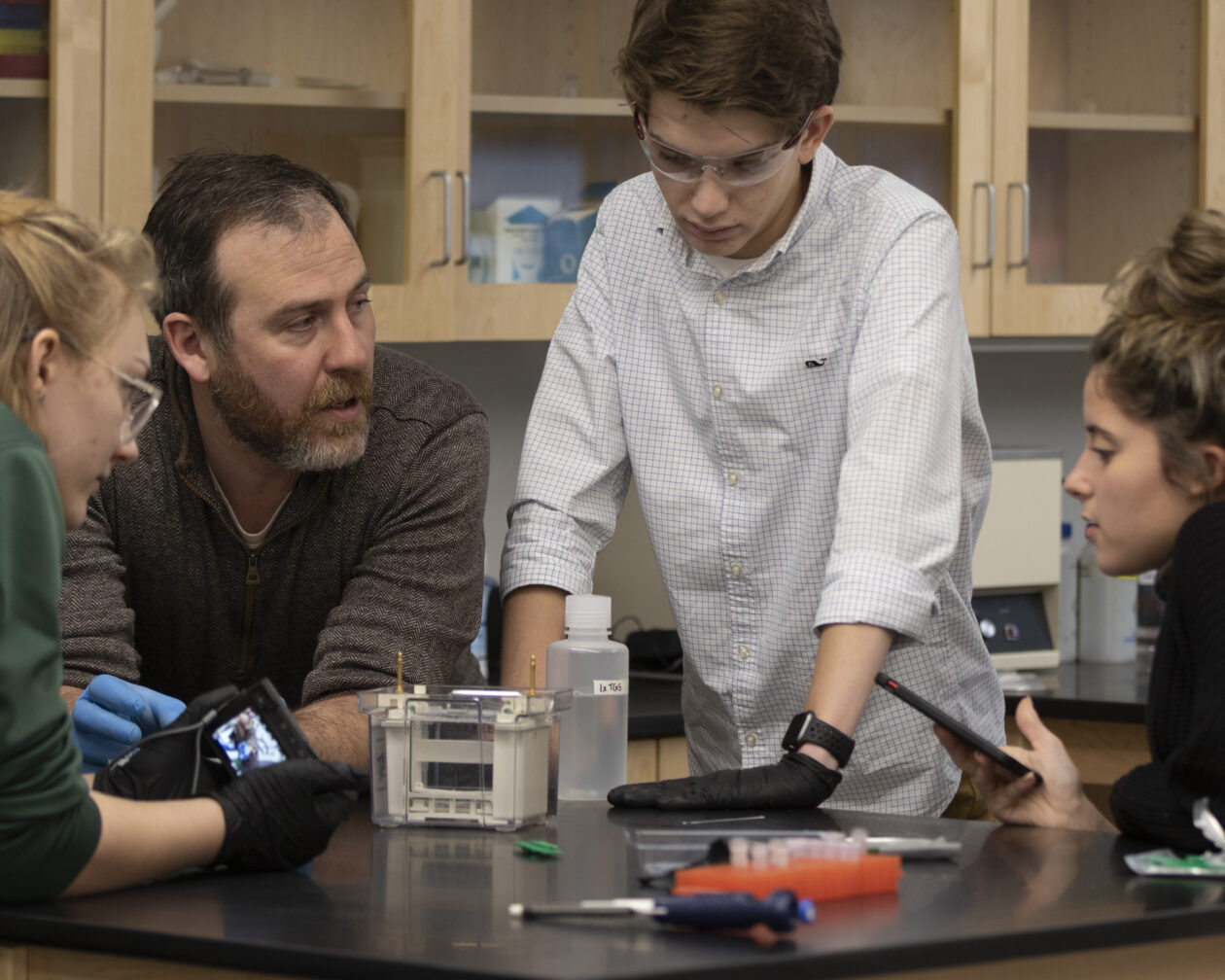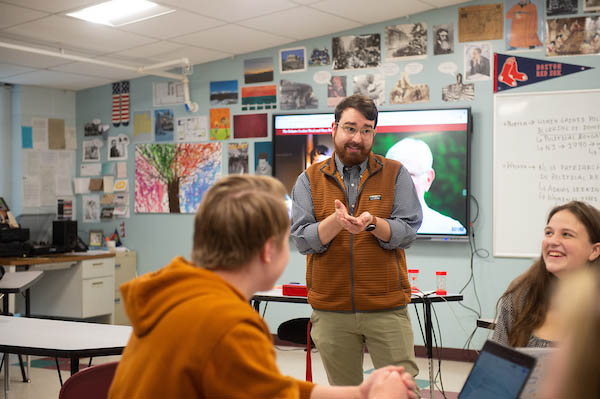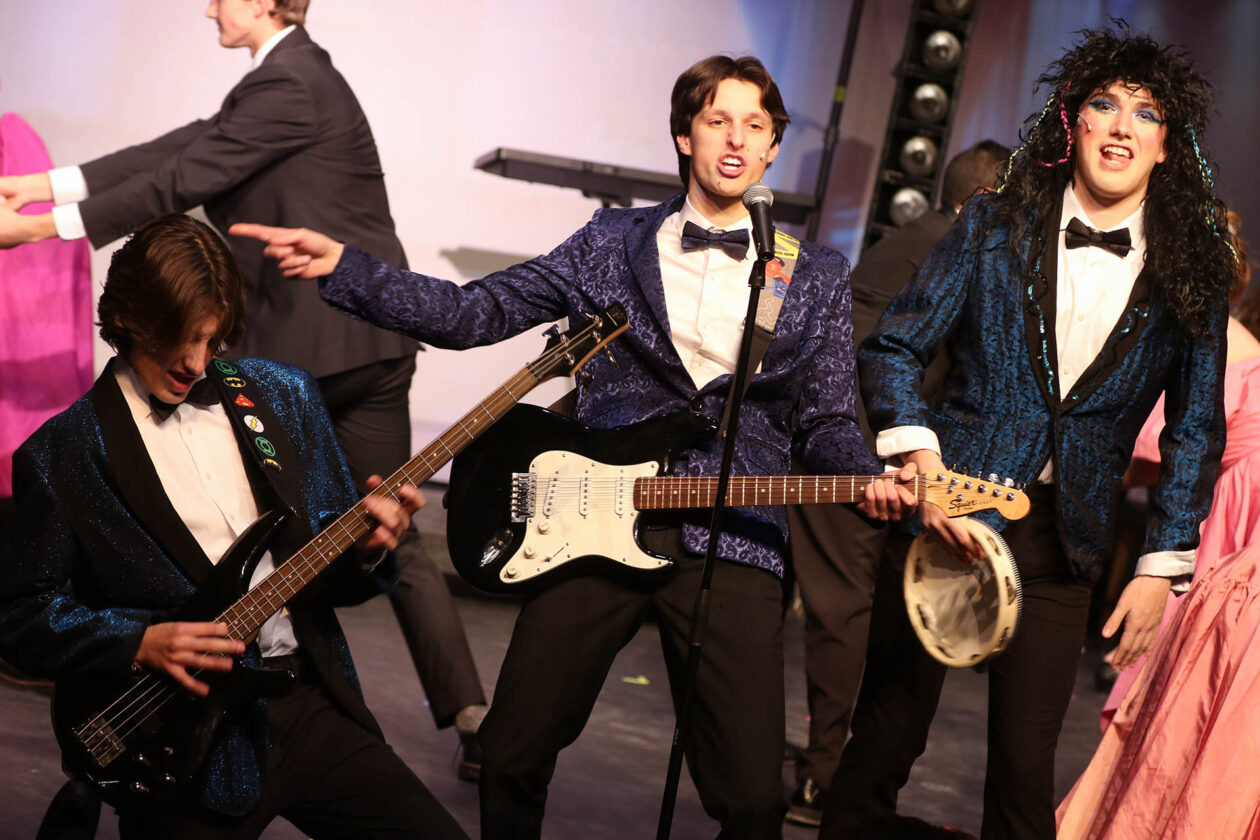Upper School World Language
The Philosophy
The purpose of the World Language Department is to guide students as they develop the skills necessary to communicate and to interact effectively and empathetically in an increasingly interconnected world. The study of language develops the student’s ability to compare and connect his or her own way of life to the global community. We encourage our language students to use their linguistic skills and cultural knowledge beyond the classroom. The World Language Department believes that the study of other languages and cultures is a vital part of a student’s secondary-school education.
Latin I
Open to: Grades 9-12
Latin I introduces students to the world of the ancient Romans and their language. The course covers the fundamentals of the Latin language by studying its grammar, morphology, and pronunciation with the goal of translating appropriately leveled Latin readings. In their translations and supplementary readings, students study aspects of Roman daily life with a focus on the town of Pompeii and its well-preserved ruins. Class activities include practice through Latin readings, reading and pronouncing Latin words, and occasionally Latin composition. Ongoing discussions and creative projects, such as the “Escape from Pompeii” project, engage students with various aspects of Roman daily life. As English and other western languages are in large part derived from Latin, students will use their study of Latin to learn how modern languages function.
Latin II
Open to: Grades 9-12
Prerequisite: Latin I
In Latin II, students begin with a thorough review of the grammar covered in Latin I. From this point, students will seek mastery in more difficult grammatical constructions and vocabulary through increasingly complex readings and Latin composition. Through Latin readings about Roman expansion and related cultural shifts, students continue to analyze grammar and acquire vocabulary. Students further develop their research skills as they study this year’s thematic focus on Roman power in the ancient world and demonstrate their knowledge through presentations and projects on language and history, such as the Roman Republic military project. The course will continue to present linguistic concepts through Latin that will enhance their knowledge of the English language and other romance languages, and continue to offer students opportunities to reflect on the connections between the ancient past and modern world.
Latin III
Open to: Grades 9-12
Prerequisite: Latin II
In Latin III, students conclude their study of Latin grammar and move on to reading unadapted Latin written by Roman authors. The course begins with a thorough review of grammar covered in previous years and moves into studying more complex, nuanced topics that are centered around Roman government in its structure and practice. Students will encounter Latin texts from Roman authors such as Cicero, Caesar, Ovid, Catullus, and Vergil. During class, students translate, analyze themes in their readings, and use a variety of modes to expand their vocabulary. In addition to class activities, students give presentations to their classmates on Latin grammar and engage in projects such as the Roman author project where they research the background and style of an author and present a passage to the class
Honors Latin III
Open to: Grades 9-12
Prerequisite: Latin II
This fast-paced course is designed for students who wish to delve into a deeper level and encounter material at a faster pace than Latin III. Students in Honors Latin III finish the whole of Latin grammar sooner than in Latin III and move on to spend more time reading unadapted texts written by Roman authors. Students will encounter Latin texts from Roman authors such as Cicero, Caesar, Ovid, Catullus and Vergil. Students will also be introduced to metered Latin poetry and learn how to read and scan dactylic hexameter. In class, students will translate, analyze themes in their readings, and use a variety of modes to expand their vocabulary. The historical focus for this year is learning about the Roman government in its structure and practice. In addition to class activities, students engage with projects such as the Roman author project and Cicero composition project in order to engage with the background and style of these authors.
Latin IV/V
Open to: Grades 9-12 Prerequisite: Latin III or Latin IV A combined class, this two-year sequence deepens students’ understanding of both the language and culture of ancient Rome while exploring the themes of war and memory, the costs of colonialism & empire, and othering of foreigners. Students read passages from Vergil’s Aeneid and Julius Caesar’s de bello Gallico in alternating years. While reading these texts, students analyze writing styles and parse difficult grammar and syntax. In addition to language work, students explore the Roman world through papers, presentations, and projects, such as the Caesar-style ethnographic commentary and the personal Aeneid shield, leadership portrait, and more.
Advanced Topics Latin: Poetry in the Golden Age of Rome
Open to: Grades 11 & 12
Prerequisite: Honors Latin III, Latin III or Latin IV
In this capstone course, students explore the world of Latin poetry during the fall of the Roman Republic and into the early empire period. Readings are selected from a variety of Roman poets from the period from the late Republic to the early Empire. Authors may include Vergil, Catullus, Ovid, Lucretius, and others. In combination with the main Latin readings, the students explore elements of style in metered Latin poetry from Roman sources such as Cicero and Quintilian. Our units include ancient philosophy, female voices in Roman poetry and a choice unit where students choose the author or genre. Students in classwork and projects engage with modern scholarship in order to connect with the most recent work in classics. The course culminates in a project where students rewrite the story of Orpheus and Eurydice where they rewrite the myth in meter. The two Advanced Topic courses in Latin are offered in alternating years. This course will be offered in 2023-24.
Advanced Topics Latin: Survey of Roman Prose Authors
Open to: Grades 11 & 12
Prerequisite: Honors Latin III, Latin III or Latin IV
In this capstone course, students read important works of Latin prose, or works not written in meter, from several genres with an emphasis on both translation and interpretation. The course begins with historical works by Caesar, moves to the oratory of Cicero, delves into the more difficult biographies of Suetonius and history by Tacitus or others, and finishes with a unit chosen by the students. Discussion of the Roman political sphere pervades this course. While reading these authors and delving into the cultural ramifications and historical context for political decisions, students explore the background and style of each author through projects, which may include research for a reacting to the past style game or a composition unit, where they are expected to write in the style of each author. The two Advanced Topic courses in Latin are offered in alternating years. This course will next be offered in 2024-2025.
Spanish I
Open to: Grades 9-12
Learning Spanish not only benefits the brain of the student, it can broaden the worldview of the learners. In Spanish I, students gain basic vocabulary and grammar scaffolded in six thematic units and varied interactive activities to be able to read, write, listen, and speak in the target language. Through adapted cultural readings, short videos, music, and audios, students discover traditions, customs and history of some of the Hispanic cultures and communities in the U.S. and abroad. Students compose oral presentations, simulate numerous interpersonal situations, and solve many interpretive challenges. Activities include students creating videos in Spanish to introduce themselves and their classes and writing original comic strips using the verb estar.
Spanish II
Open to: Grades 9-12
Prerequisite: Spanish I
Building upon students’ learning in Spanish I, this course introduces more thematic vocabulary, idiomatic expressions, and past tense verb conjugations. Units include new vocabulary to discuss daily routines, food, holidays, technology and our homes. Students also expand their knowledge of geography, history and cultures of the Spanish-speaking world through videos and short readings about Chile, Guatemala, Peru and more. Activities, games and homework target students’ abilities to read and write in Spanish with an increasing emphasis on listening comprehension and ability to speak Spanish as the year progresses. Students frequently collaborate in class with peers to perform short skits or presentations in Spanish. Students may work on some larger group projects such as the “Cuento para niños” assessment, which asks students to write and illustrate a children’s book in Spanish. The course is conducted primarily in the target language, with English used as a comparative reference model or to clarify more complex concepts. Students are expected to participate daily in Spanish with a focus on a broader vocabulary and improved pronunciation.
Spanish III
Open to: Grades 9-12
Prerequisite: Spanish II
Spanish III is an intermediate-level course designed to build upon students’ learning from Spanish I & II through thematic units that include a multitude of verb forms, including the subjunctive mood. These grammar structures equip students with the ability to communicate more effectively in the target language. Vocabulary units include new terms to discuss the natural world, life in the city, well-being, creative arts and current events. Activities, games and homework place greater emphasis on written Spanish than in previous years, as students at this level possess more complex grammar to express themselves. Compositions often demand students to make cultural and historical comparisons while also employing creative writing. Students may also work collaboratively on creative projects, such as using new vocabulary to draft and present an initiative to make the Derryfield School more green. Listening comprehension is heavily emphasized, as the class is taught almost exclusively in the target language, and students are presented with more recordings and videos in Spanish. Students are expected to participate daily in Spanish with a strong emphasis on more complex communication and expression.
Honors Spanish III
Open to: Grades 9-12
Prerequisites: Spanish II or approval of teacher and department chair
In Honors Spanish III, students integrate vocabulary and complex syntaxis at an accelerated pace and strive to speak in the target language as an authentic means of connecting communities. In this honors, intermediate-level course, students build upon their learning from Spanish I & II through thematic units that include a multitude of verb forms, including the subjunctive mood. Through a variety of texts (short story, advertising, journalistic, etc.) that reflect the cultural, social, and linguistic diversity of the Hispanic societies, students advance their interpersonal, interpretive, and presentational skills and discover some diversity of perspectives within contemporary Spanish-speaking cultures. Students write several types of texts to use different rhetorical devices and ways of using the target language including an in-class essay about the story “La abuelita y el puente de oro.” Topics may include environmentalism, literature, music, cities, health, family, art, and politics.
Spanish IV
Open to: Grades 9-12
Prerequisite: Spanish III, Honors Spanish III or approval of teacher and department chair
In Spanish IV, students continue to hone their communication and writing skills in this course which is aimed at expanding students’ vocabulary and grasp of advanced grammatical structures and at improving overall fluency. Students learn and work with thematic vocabulary which is embedded in cultural and literary readings as well as in authentic short films from Spain and Latin America. The themes of this course include personal relationships, pastimes, daily life, health and wellbeing, travel, and nature. This class is conducted almost exclusively in Spanish and the students are expected to speak only in Spanish. Activities include writing original odes, researching and presenting health and well being topics, and creating and performing skits in the target language.
Spanish V
Open to: Grades 9-12
Prerequisite: Spanish IV, or approval of teacher and department chair
Spanish V is designed for Spanish students who want to continue their studies of advanced grammar topics and to improve their reading and writing skills through literature, film and current events. Students continue to study complex grammar topics including the preterite vs. the imperfect and the subjunctive and indicative moods. Students read and analyze short stories by Gabriel García Márquez, Isabel Allende, Jorge Luis Borges, and Julio Cortázar and also read several chapters of Miguel de Cervantes’ famous novel, El ingenioso hidalgo don Quijote de la Mancha. Students submit literary analyses and investigate and present current events from the Spanish-speaking world. This course is taught in Spanish and students are expected to discuss and write only in Spanish as well. Activities include writing a modern Quijote-like adventure and a school president speech and formally analyzing readings through written essays. Students also watch authentic short films and videoclips based on our readings.
Advanced Topics Spanish: Language and Culture through Literature and Media
Open to: Grades 11 & 12
Prerequisite: Approval of teacher and department chair, typically after Honors Spanish III, Spanish IV or another AT Spanish course
This course is designed for advanced Spanish students interested in attaining fluency in Spanish by exploring major contemporary and historical themes and perspectives from the Spanish-speaking world. We examine authentic sources including literature, film and other media sources such as news, podcasts, music, social media, and television programs. Some titles include medieval and modern works such as La casa de Bernarda Alba by Federico García Lorca, El burlador de Sevilla by Tirso de Molina, El ingenioso hidalgo don Quijote de la Mancha by Miguel de Cervantes, and films including La lengua de las mariposas by Spanish director, José Luis Cerda, and the documentary film, Living on One Dollar, by directors Chris Temple, Zach Ingrasci, Sean Leonard and Sean Kusanagi. Students work both collaboratively and independently to research, analyze, and present cultural and literary topics including their creating a non-profit organization and accompanying Google Site to address a real-world problem in the Spanish-speaking world. Proficiency in Spanish is developed and enhanced through class discussions, dialogues, debates, formal writing, and presentations as well as through intensive review of language structure, including vocabulary amplification from our readings and other course materials. Students continue to study and be tested on advanced grammar units. This course is taught exclusively in Spanish and students are expected to discuss and write only in Spanish. The two Advanced Topic courses in Spanish are offered in alternating years. This course will be offered in 2023-24.
Advanced Topics Spanish: The Pursuit of Social Justice and Equality in the Spanish-speaking World
Open to: Grades 11 & 12
Prerequisite: Recommendation of teacher and department chair, typically after Honors Spanish III, Spanish IV or another AT Spanish course
Advanced Topics Spanish students develop and strengthen their linguistic and analytical skills in Spanish through examining authentic poetry, prose, plays, film, and other media sources. This AT Spanish course explores emerging voices and themes centering on the fight against social injustice and the pursuit of equal rights for all, especially for the disempowered. Some titles include poetry by Alfonsina Storni, Julia de Burgos and Sor Juana Inés de la Cruz, La vida de Lazarillo de Tormes y de sus fortunas y adversidades by an anonymous author, and the documentary film, El silencio de otros by Spanish directors Almudena Carracedo and Robert Bahar. Students reflect and present through creative and analytical writings, skits, debates, journal entries, interactive presentations, poetry recitations, and podcasts. Students continue to study and be tested on advanced grammar units. This course is taught exclusively in Spanish and students are expected to discuss and write only in Spanish. The two Advanced Topic courses in Spanish are offered in alternating years. This course will next be offered in 2024-25.
Online Options For Languages Not Offered At Derryfield
Students have the option to fulfill their language graduation requirement through online learning in a language not offered at Derryfield. This option gives students the flexibility to study such languages as French, German, Japanese and Arabic. Students still must complete level three of their language in order to graduate. This option is designed for highly-motivated and passionate students. The Language Department Chair and the student’s academic advisor will work closely with interested students to determine if such an option is feasible for a student, based on their academic standing and other non-academic commitments. Just as we would ask that students think of proper balance for their course loads during the course selection process, we would help the student/parents weigh the pros and cons of taking an online language program.
If students are interested in exploring this option, they should contact Mike Leary, Language Department Chair, at mleary@derryfield.org. Please consider the following:
- As with all online options at Derryfield, except for Malone classes, this will be a student’s sixth class.
- Students must submit a formal proposal via email to the Language Department Chair by February 14 for current Derryfield students. This proposal should include the following information:
- A 1-2 page proposal detailing their proposed plan and their rationale for taking an online course versus a course at Derryfield. This proposal should include program curricular information.
- Materials and/or link from the online program showing its rigor, expectations, and general course outline.
- A signed form or email from the student’s parents indicating support of the proposal and a clear understanding of the graduation requirement component of the program.
- The proposal will be evaluated by the Department Chair and recommended to the Division Head and Dean of Academics for approval.
- Derryfield acknowledges it cannot ensure that a student will have the same level of experience or success with an online provider as he or she will have with a Derryfield language course. As a result, the responsibility rests with the parents to choose a program that will serve their child and to help monitor their child’s progress.
- Families will incur the cost of online tuition, sign-up, monitor progress, and address technology needs and issues.
- Except for Malone classes, which are taught twice a week during the school day, students must enroll in a language program that does not conflict with any other Derryfield commitments.
- Students/Families will be asked to provide the school with a progress report/certificate/documentation/transcript at the end of each Derryfield trimester and also upon completion of their online language course by June of that academic year.
- Online language courses are listed as “Pass/Fail” on the Derryfield transcript with the grade on the back of the transcript.
- Students must finish their course by the last day of the academic year.





